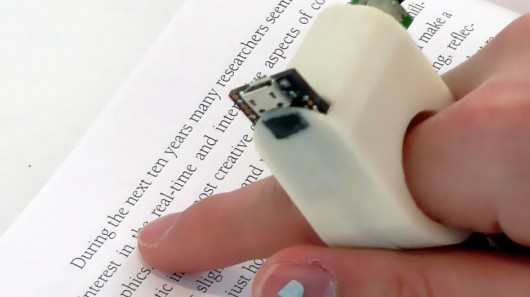FingerReader helps visually impaired read in real-time
By Nick Lavars
July 14, 2014

FingerReader uses a built-in camera to scan pieces of text, providing audio feedback to the visually impaired in real-time
Our age-old instinct to point at things we'd like to know more about has inspired a device that assists the visually impaired consume written text. FingerReader is a 3D-printed device that is worn as a ring on the index finger and uses a built-in camera and haptic actuators to read aloud as the user traces lines of printed words.
Researchers at the MIT Media Lab were looking to develop a device to help the visually impaired read text, but that felt more natural than other solutions on the market. Read pens, scanners and apps such as TextGrabber and ZoomReader similarly assist the blind by processing slabs of text, though in the eyes of the MIT team, could be improved upon in terms of user experience.
Aside from combining real-time audio feedback with the tactile, natural feel of running a finger-tip along a line of printed text, FingerReader is designed to make the experience closer to the physical act of reading. The algorithm scans multiple words at once and is then able to guide the user, making sure they don't veer off the line of text. The team also claims the ring starts working almost immediately, while other solutions can take several minutes to detect the words depending on changes in lighting and environment.
The researchers say that the potential of FingerReader is not limited to assisting the visually impaired. They also tout its potential in helping to pronounce words in other languages and teaching young children how to read. As for translating other languages in real time, the team sees no reason the ring couldn't rival smart phone apps currently serving the same purpose, though it hasn't implemented these functions just yet.
As it stands, FingerReader is purely a proof of concept prototype. The team hopes that it can one day serve not just the three percent of the US population that is visually impaired, but the elderly, the young, language students and tourists. The researchers will now set about making FingerReader faster, more reliable and smaller, while also exploring ways it could be enhanced through pairing with mobile devices.
You video below shows the FingerReader in action.
Source: MIT Media Lab
copyright © Gizmag 2003 - 2014
http://www.gizmag.com/fingerreader-blind-read-written-text/32936/